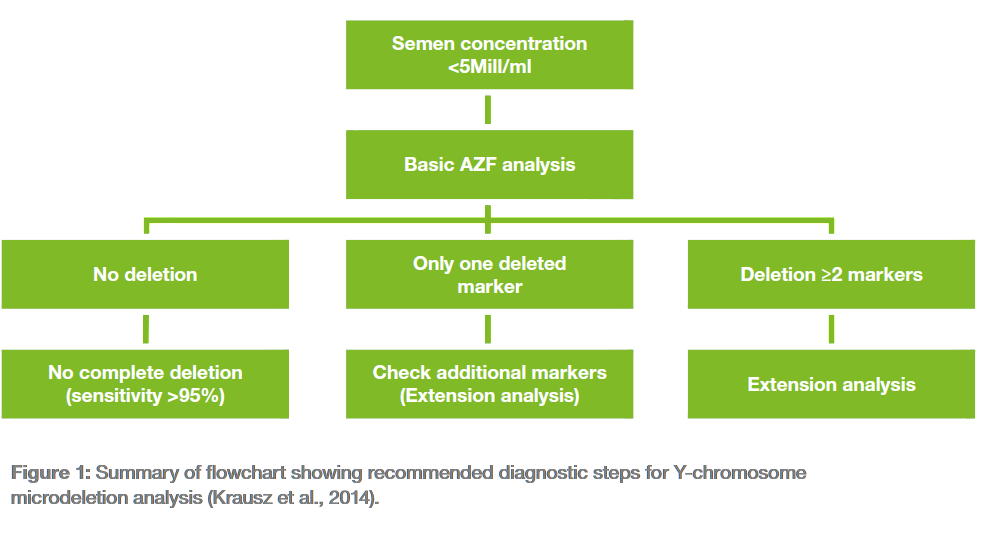SCOPE™ Kits


Identifying the genetic causes of male infertility may lead to more effective clinical treatment of patients. Statistically, 10–15% of couples have difficulty conceiving, with male-related factors such as low sperm count thought to be an underlying issue in about 50% of cases. While in most incidences the causes of male infertility are unknown, several studies have shown that sex chromosome aneuploidy and microdeletions in specific regions of the Y chromosome can play a role.
Klinefelter syndrome is the most common sex chromosome aneuploidy associated with male infertility. This syndrome has an incidence in live births of between 1:500 and 1:650 males and the most common cause is an extra copy of the X chromosome (karyotype 47, XXY).
Y-chromosome microdeletions are the next most common genetic cause of male infertility, with microdeletions in three regions (AZFa, AZFb, AZFc) detected in up to 7% of cases of oligospermia (low sperm count) and in 13% of cases of non-obstructive azoospermia. These microdeletions occur due to the homologous recombination of repetitive sequences in these regions. The exact molecular mechanisms and recombination events underlying these changes have been elucidated. These regions are located on the Yq11 chromosome and, although the AZFa microdeletion region is distinct, there is a significant degree of overlap between the regions affected by the AZFb and AZFc microdeletion.
European Academy of Andrology (EAA) and European Molecular Genetics Quality Network (EMQN) recommendations
The European Academy of Andrology (EAA) and the European Molecular Genetics Quality Network (EMQN) have published a set of best practice guidelines for Y-chromosome microdeletion testing. In 2013, these guidelines were modified to include a broader analysis that provided further characterisation and sizing of the AZF region microdeletions detected using a separately defined set of markers.
Male Factor Infertility Kit
The Male Factor Infertility Kit detects both sex chromosome aneuploidy and Y-chromosome microdeletions in a single assay using the QF-PCR (Quantitative Fluorescence-Polymerase Chain Reaction) technique and a capillary electrophoresis genetic analyser. This kit uses EAA and EMQN prescribed markers and primers to detect Y-chromosome microdeletions affecting the AZFa, AZFb and AZFc regions in accordance with best practice guidelines.
Features:

MFI-Y plus Kit
The MFI-Yplus Kit is an assay complementing the Male Factor Infertility Kit, which contains 11 additional markers for characterisation of Y-chromosome microdeletions in line with published guidelines. This kit runs on the same instrument as the Male Factor Infertility Kit and under the same conditions.
Besides the analysis of aneuploidy and microdeletions, it offers the possibility of screening for male infertility caused by congenital unilateral absence of the vas deferens (CUAVD) and/or congenital bilateral absence of the vas deferens (CBAVD) with the Elucigene CF-EU2v1 kit. These types of problems have been associated with mutations in the CFTR gene, which is also involved in cystic fibrosis. The Elucigene CF-EU2v1 kit analyses 50 mutations of said gene.
| Product | Presentation | Reference |
|---|---|---|
| Male Factor Infertility Kit | 25 tests/kit | AZFXYB1 |
| MFI-Y plus Kit | 10 tests/kit | AN6XYB1 |
Public Documentation
Related products
2021 © Diagnóstica Longwood SL
This website uses cookies so that we can provide you with the best user experience possible. Cookie information is stored in your browser and performs functions such as recognising you when you return to our website and helping our team to understand which sections of the website you find most interesting and useful.
Strictly Necessary Cookie should be enabled at all times so that we can save your preferences for cookie settings.
If you disable this cookie, we will not be able to save your preferences. This means that every time you visit this website you will need to enable or disable cookies again.
This website uses Google Analytics to collect anonymous information such as the number of visitors to the site, and the most popular pages.
Keeping this cookie enabled helps us to improve our website.
Please enable Strictly Necessary Cookies first so that we can save your preferences!
Más información sobre nuestra política de cookies
